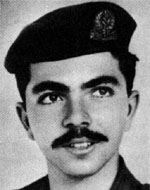Goldzweig, Hanan (“Hanani”)
Son of David and Tova. He was born on the 11th of Kislev 5707 (23.11.1947) in Jerusalem, where he studied at the “Hadarom” elementary school and after completing his studies he studied at the Hebrew Gymnasium in Rehavia and received a matriculation certificate. In the coming days, he studied at the Hebrew University of Haifa, where he was drafted into the IDF in November 1965 and was one of the few in his class at the Gymnasium that turned to the paratroopers. During his service he soon became a lieutenant. Loved his home and family and liked his friends. He participated in the battles of the Six-Day War and commanded a paratrooper patrol force in the Jordan Valley. He later took part in Operation Karameh, the retaliatory action against the Jordanian terrorists. Then came the pursuit of these murderers and penetrated a depth of 30-40 kilometers into Transjordan, where he volunteered for every place and dangerous action, while on duty on the morning of April 28, 1968, A patrol force along the border in the Jordan Valley and discovered a squad of Fatah members. He chased after them, came in contact with them, attacked his soldiers’ heads, but was wounded and fell. A few weeks before they fell, after the Sabbath break, when he was ready to return to his unit, his mother asked him when he would come home again. “I do not know when – and if I ever return!” The mother responded with tears in her eyes: “What are you talking about? And Hanan replied: “You have two other nice children, only care for them – and I will take care of myself.” Was laid to rest in the military cemetery on Mount Herzl in Jerusalem. In his letter of condolences to his parents, the commander of his unit described him as an exemplary soldier, devoted and talented and loyal to his friends. “Because of these qualities, he was chosen to be sent to a squad commanders ‘course and then to an officers’ course, both of which he successfully completed. When the unit was established about a year ago, he volunteered for it and served as a platoon commander – and in this position he succeeded and won the appreciation of his commanders and the affection of his soldiers. He was considered the best of the unit commanders in the unit and was intended to promote him. In the Six Day War, he fought in Latrun and in the northern part of Jerusalem, and showed courage and perseverance in all his missions. After the war, he continued to carry out the unit’s tasks in the framework of routine security, took part in many pursuits of Fatah’s murder squads in ambushes … and even in the conquest of Damiya Bridge and in the fighting against the Jordanian army. ” In the “Nation” quarter (May 1969), an article was published by H. Merhavia, entitled “Profile 971793.” There were also articles on it in several publications (Face to Face, In Action).
